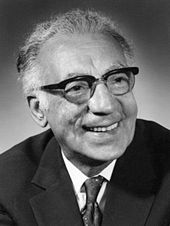
`Alí-Akbar Furútan
Encyclopedia

Iran
Iran , officially the Islamic Republic of Iran , is a country in Southern and Western Asia. The name "Iran" has been in use natively since the Sassanian era and came into use internationally in 1935, before which the country was known to the Western world as Persia...
ian Bahá'í
Bahá'í Faith
The Bahá'í Faith is a monotheistic religion founded by Bahá'u'lláh in 19th-century Persia, emphasizing the spiritual unity of all humankind. There are an estimated five to six million Bahá'ís around the world in more than 200 countries and territories....
educator and author who was given the rank of Hand of the Cause in 1951.
A native of Sabzivár
Sabzevar
Sabzevar is a city in, and the capital of Sabzevar County, in Razavi Khorasan Province in northeastern Iran. At the 2006 census, its population was 208,172, in 57,024 families.It is approximately 220 kilometres west of Mashhad, the provincial capital...
in what was, at the time, Iran
Iran
Iran , officially the Islamic Republic of Iran , is a country in Southern and Western Asia. The name "Iran" has been in use natively since the Sassanian era and came into use internationally in 1935, before which the country was known to the Western world as Persia...
's Khurásán, `Alí-Akbar Furútan was still a child when he witnessed the persecution of his family and others for their beliefs. Seeking safety, the family moved in 1914 from Sabzivár to Ashkhabad in Turkestan
Russian Turkestan
Russian Turkestan was the western part of Turkestan within the Russian Empire , comprising the oasis region to the south of the Kazakh steppes, but not the protectorates of the Emirate of Bukhara and the Khanate of Khiva.-History:-Establishment:Although Russia had been pushing south into the...
, which was then a part of Tsarist Russia. In 1926, nine years after the Russian Revolution, 21-year-old Furútan won a scholarship to the University of Moscow, where he studied education and child psychology. Within four years, as a result of his Bahá'í activities, he was expelled from the Soviet Union
Soviet Union
The Soviet Union , officially the Union of Soviet Socialist Republics , was a constitutionally socialist state that existed in Eurasia between 1922 and 1991....
and, in 1930, returned to Iran.
After he returned to Iran, he and his wife helped administer the Tarbiyat School for Boys, which was later closed by the Pahlavi government.
Later, `Alí-Akbar Furútan was elected to the National Spiritual Assembly
Spiritual Assembly
Spiritual Assembly is a term given by `Abdu'l-Bahá to refer to elected councils that govern the Bahá'í Faith. Because the Bahá'í Faith has no clergy, they carry out the affairs of the community...
of Iran in 1934, serving as its secretary until 1957. In December 1951 he was appointed a Hand of the Cause of God
Hands of the Cause
The Hands of the Cause of God, Hands of the Cause, or Hands were a select group of Bahá'ís, appointed for life, whose main function was to propagate and protect the Bahá'í Faith...
by Shoghi Effendi
Shoghi Effendi
Shoghí Effendí Rabbání , better known as Shoghi Effendi, was the Guardian and appointed head of the Bahá'í Faith from 1921 until his death in 1957...
. From 1959 to 1963 he served as one of the nine Custodians at the Bahá'í World Centre
Bahá'í World Centre
The Bahá'í World Centre is the name given to the spiritual and administrative centre of the Bahá'í Faith. The World Centre consists of the Shrine of Bahá'u'lláh near Acre, Israel, the Shrine of the Báb and its gardens on Mount Carmel in Haifa, Israel, and various other buildings in the area...
in Haifa
Haifa
Haifa is the largest city in northern Israel, and the third-largest city in the country, with a population of over 268,000. Another 300,000 people live in towns directly adjacent to the city including the cities of the Krayot, as well as, Tirat Carmel, Daliyat al-Karmel and Nesher...
, Israel
Israel
The State of Israel is a parliamentary republic located in the Middle East, along the eastern shore of the Mediterranean Sea...
.
Throughout his life, `Alí-Akbar Furútan taught Bahá'í classes for children and youth, and he published many works in the area of child spiritual and material education.
`Ali-Akbar Furútan died in Haifa five months before his 99th birthday.
Works
- Bahá'í Education for Children (6 volumes; originally Kitab-i-Dars-i-Akhlagh [Books for Moral Education])
- Several books in PersianPersian languagePersian is an Iranian language within the Indo-Iranian branch of the Indo-European languages. It is primarily spoken in Iran, Afghanistan, Tajikistan and countries which historically came under Persian influence...

